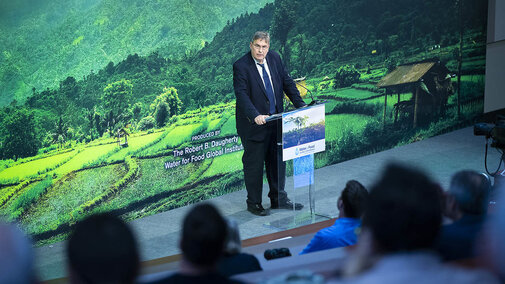As the global population continues to boom, demanding increased food production, it’s crucial for society to implement effective and efficient water-management practices. Mark Rosegrant, research fellow emeritus at the International Food Policy Research Institute, spoke on this topic during the University of Nebraska–Lincoln’s final Heuermann Lecture of the 2018-19 season April 30 at Nebraska Innovation Campus.
“The power of water in addressing food security and nutrition is that it contributes through many pathways,” Rosegrant said.
One of the pathways he examined was irrigation and how it can contribute to increased food production and farm income, while reducing risk through improved resilience against weather variability. Another pathway critical to achieving food security and nutrition goals is a high-performing water, sanitation and hygiene sector. Water pollution and water quality are currently the largest inhibitors of this sector. Water pollution affects human nutrition, health, economic development and the environment, whereas poor water quality leads to increased competition among water users for shrinking supplies of unpolluted water.
“There are billions still without access to safe drinking water, adequate hygiene and sanitation,” Rosegrant said.
With a doctorate in public policy from the University of Michigan, Rosegrant has extensive experience researching and analyzing policy related to agriculture, economic development and the world's future food security. He focuses on water resources and other issues that influence rural livelihoods and environmental sustainability. Rosegrant is the author or editor of 15 books and more than 100 refereed papers in agricultural economics, water resources and food-policy analysis. He has won numerous awards and is a fellow of the American Association for the Advancement of Science, and the Agricultural and Applied Economics Association.
Rosegrant’s key strategies to address water and food security included new technologies; water governance; trade policy; movement toward more balanced diets; and water rights.
“Water rights are a cornerstone of efficient and equitable water management, empowering users by requiring consent and awarding compensation for reallocation,” Rosegrant said.
He said water rights are best defined as the perpetual right to share all allocations made in a river basin or system.
Also included in Rosegrant’s strategies is the need for increased support of agricultural research and development. He specifically called for interdisciplinary research at the nexus of water, food and nutrition, referencing the promising work occurring at the University of Nebraska–Lincoln.
“We should use the great expertise here at land-grant institutions and other educational opportunities to enhance research and development of solutions,” he said.
The lecture was held in conjunction with the Water for Food Global Conference, which explored the next generation of research, smart technology, policy development and best practices that are achieving breakthroughs in water and food security. The two-day conference brought together 350 participants from 15 countries. It was hosted by the Daugherty Water for Food Global Institute at the University of Nebraska.
Heuermann Lectures are funded by a gift from B. Keith and Norma Heuermann of Phillips. The Heuermanns are longtime university supporters with a strong commitment to Nebraska's production agriculture, natural resources, rural areas and people.
Lectures are streamed live at http://heuermannlectures.unl.edu and air live on campus channel 4. They are archived after the event and later air on NET2 World.

